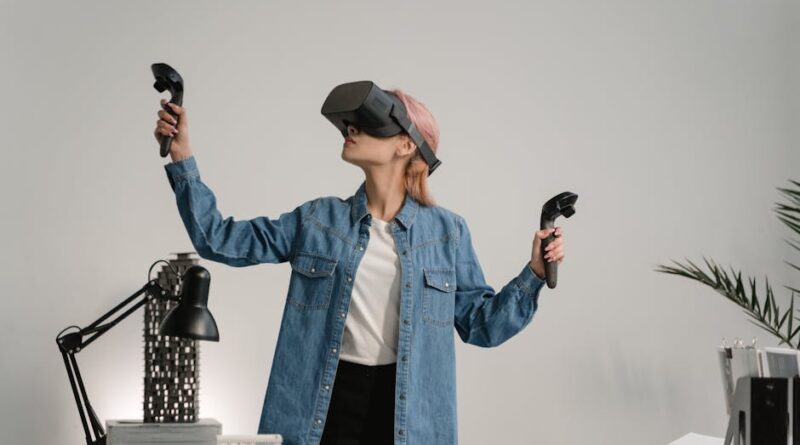The Rise of Virtual Reality in Real Estate
Virtual reality (VR) technology has been revolutionizing various industries, and the real estate sector is no exception. The ability to virtually tour properties, visualize spaces, and experience homes before physically visiting them has transformed the way people buy, sell, and rent properties. In this article, we delve into the rise of virtual reality in real estate, exploring its impact, benefits, challenges, and future implications.
Virtual Reality: A Game-Changer in Real Estate

Imagine being able to walk through a potential home, explore every room, and experience the layout and design without leaving your couch. This is the power of virtual reality in real estate. By donning a VR headset, buyers can immerse themselves in a 3D virtual tour of a property, giving them a realistic sense of the space and helping them make informed decisions. Virtual reality has become a game-changer in the real estate industry, offering a new way to showcase properties and attract buyers.
Enhancing the Property Viewing Experience

Traditional property viewings can be time-consuming and inconvenient for both buyers and sellers. With virtual reality, potential buyers can take a virtual tour of multiple properties in a single sitting, saving time and effort. Virtual reality also allows buyers to customize their viewing experience, such as changing the furniture, paint colors, or flooring to see how the space would look with their personal touch. This level of customization enhances the property viewing experience and helps buyers envision themselves living in the space.
Increased Engagement and Interest

Virtual reality has the power to captivate and engage potential buyers in ways that traditional listings cannot. By offering virtual tours of properties, real estate agents can attract a larger audience and generate more interest in a listing. Studies have shown that properties with virtual tours receive more views and inquiries than those without. Virtual reality can make a listing stand out in a crowded market and increase the chances of a sale.
Cost-Effective Marketing Tool

Virtual reality technology has become more accessible and affordable in recent years, making it a cost-effective marketing tool for real estate agents and developers. Instead of hosting multiple open houses or staging properties, agents can create virtual tours that can be accessed anytime, anywhere. Virtual reality tours also have a longer shelf life than traditional marketing materials, allowing properties to be showcased for an extended period. This not only saves time and money but also attracts a wider audience of potential buyers.
Remote Buying and Selling
One of the key advantages of virtual reality in real estate is its ability to facilitate remote buying and selling. Buyers can tour properties from anywhere in the world, eliminating the need for in-person visits. This is particularly beneficial for international buyers or those relocating to a new city. Virtual reality also enables sellers to showcase their properties to a global audience, increasing the likelihood of a quick sale. The convenience and accessibility of virtual reality make the buying and selling process more efficient and seamless.
Challenges and Considerations
While virtual reality offers numerous benefits in the real estate industry, there are also challenges and considerations to keep in mind. One of the main challenges is the initial cost of implementing virtual reality technology. Real estate agents and developers may need to invest in specialized cameras, software, and VR headsets to create and showcase virtual tours. Additionally, not all buyers may be comfortable using virtual reality or may prefer traditional viewings. It is essential to cater to a diverse range of preferences and provide options for both virtual and in-person viewings.
Future Implications of Virtual Reality in Real Estate
The future of virtual reality in real estate looks promising, with continued advancements in technology and growing acceptance among buyers and sellers. As virtual reality becomes more mainstream, we can expect to see even more innovative uses in the industry. Virtual reality could potentially be used for property staging, interior design consultations, and even virtual open houses. The possibilities are endless, and virtual reality is poised to transform the real estate sector in profound ways.
Common Misconceptions About Virtual Reality in Real Estate
There are several misconceptions about virtual reality in real estate that are worth addressing. One common misconception is that virtual reality is only suitable for luxury properties or high-end markets. In reality, virtual reality can benefit properties of all price points and locations, helping sellers reach a wider audience and attract more potential buyers. Another misconception is that virtual reality is a passing fad that will soon fade away. However, the increasing popularity and effectiveness of virtual reality in real estate suggest that it is here to stay and will continue to evolve in the coming years.
Conclusion
Virtual reality has emerged as a powerful tool in the real estate industry, offering new ways to showcase properties, engage buyers, and streamline the buying and selling process. The rise of virtual reality in real estate has transformed the way properties are marketed, viewed, and sold, making the experience more immersive, efficient, and convenient for all parties involved. As technology continues to advance and virtual reality becomes more mainstream, we can expect to see even more innovative applications and benefits in the real estate sector. Virtual reality is not just a trend but a fundamental shift in how properties are experienced and transacted, shaping the future of real estate in exciting ways.
To wrap things up, virtual reality is redefining the real estate landscape, offering endless possibilities for buyers, sellers, and agents alike. Whether you’re in the market for a new home or looking to sell a property, virtual reality can enhance your experience and make the process more seamless and enjoyable. Embrace the future of real estate with virtual reality and discover a whole new world of possibilities.




